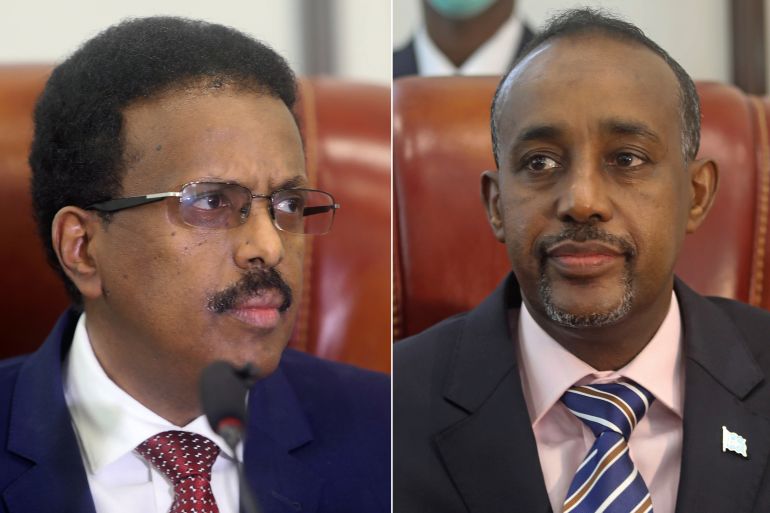Somalia’s president suspends prime minister amid election spat
Prime minister, marine forces commander suspended until corruption investigations are complete, president’s office says.

Somalia’s president said on Monday he had suspended the prime minister for suspected corruption, a move the prime minister described as a coup attempt, escalating a power struggle between the two leaders.
The months-long dispute has seen President Mohamed Abdullahi Mohamed and Prime Minister Mohammed Hussein Roble trade allegations over the holding up of parliamentary elections, and is widely seen as distracting the government from fighting the al-Shabab armed group.
Keep reading
list of 3 itemsSomalia: Caught between drought and fighting
Clashes in northeast Somalia force thousands to flee: Report
It will also raise concerns about the prospect of renewed clashes between factions in the security forces allied to each side.
Mohamed, who is widely known as Farmaajo, accused Roble of stealing land owned by the Somali National Army (SNA) and of interfering with a defence ministry investigation.
“The president decided to suspend [the] prime minister … and stop his powers since he was linked with corruption,” the office of the president said in a statement.
It added that the marine forces commander was also under investigation for corruption and had been suspended.
In response, Roble said the move to suspend his powers was unconstitutional and aimed at derailing the ongoing election. He also ordered the security forces to start taking orders from him, instead of the president.
“The aim of the illegal, crooked steps … is to derail the election and illegally remain in office,” he said in a statement, decrying what he called “an open coup attempt against the government and the national constitution”.
The outrageous statement from immediate former President, Mohamed Abdullahi (Farmajo) regarding the work of the PM & his failed attempt to militarily take over the OPM is a violation of the constitution & other laws, the consequences of which will be solely shouldered by Farmajo pic.twitter.com/P5gtkaiUsI
— SomaliPM (@SomaliPM) December 27, 2021
In a Twitter post later on Monday, the United States embassy in Somalia called for calm, saying it “strongly” urged Somalia’s leaders “to take immediate steps to de-escalate tensions in Mogadishu, refrain from provocative actions, and avoid violence”.
In a separate statement, the US State Department African Affairs Bureau called the attempted suspension of Roble “alarming” and said it supported his efforts for rapid and credible elections.
It added that it the US was also prepared to act against those obstructing Somalia’s path to peace.
The UK embassy in Somalia also urged both sides to de-escalate and to refrain from violence.
Farmaajo’s move came a day after trading accusations with Roble over the holding up of the elections.
The long-delayed elections began on November 1 and were supposed to be completed by December 24, but one newly elected legislator said that, as of Saturday, only 24 of 275 representatives had been elected.
In a statement on Sunday, Farmaajo’s office said Roble was “posing a serious threat to the electoral process and overstepping his mandate”.
Roble’s office later on Sunday released its own statement, saying the president had spent “so much time, energy and finances in frustrating the national elections” and was “derailing the electoral process”.
In the statement, Roble said he would hold meetings to find ways to speed up the election and agree “on a capable leadership to spearhead timely and transparent elections” without offering more details on how long the process might take.
Under Somalia’s complex indirect electoral process, regional councils are meant to choose a senate. Clan elders are then meant to pick members of the lower house, which then picks a new president.
Farmaajo’s move reopens a confrontation that had been resolved when he put Roble in charge of security and of organising its first direct elections in more than 30 years.
Factions of the security forces allied to Mohamed and Roble in April had seized areas of the capital, as the prime minister and opposition opposed a move to extend the president’s four-year term by another two years.
Clashes between the two groups forced between 60,000 and 100,000 people to flee their homes.
Matt Bryden, political analyst at Sahan, a think-tank focusing on the Horn of Africa, said Somalia has been in a constitutional crisis since February when the president’s mandate expired.
“The country has been held together by a political agreement between stakeholders of the federal government, federal member states and stakeholders in the elections,” Bryden told Al Jazeera.
“That was supposed to postpone the elections until today, December 27. That has not happened and that is why we are facing this crisis,” he said, adding that Farmaajo’s intervention had “created a situation of real uncertainty and danger”.
Bryden argued the electoral model was modified by Farmaajo to favour his reelection and this change is now contributing to the impasse in the electoral process.
“The entire process has come down almost to cherry picking, where seat by seat we are seeing rigging, we are seeing appointees of the president being given seats, and these are the people who will choose the next president,” he said.